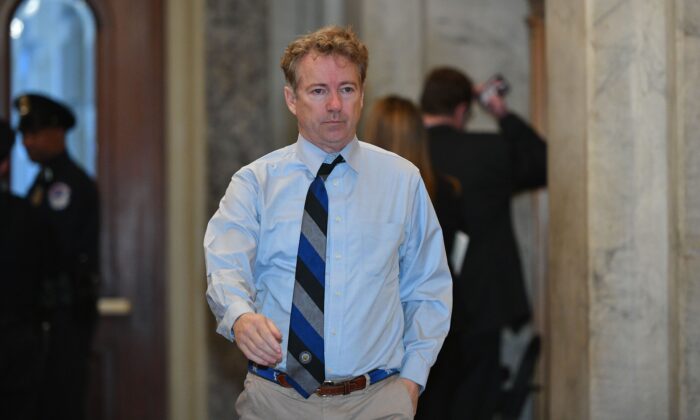President Donald Trump wants to see reforms to the Foreign Intelligence Surveillance Act (FISA) surveillance process before he endorses extending spying powers that are slated to expire in less than two weeks, according to one of the senators who met with Trump on the topic.
Trump “made it exceedingly clear” that he won’t accept a straight reauthorization, said Sen. Rand Paul, (R-Ky.), who has led efforts to curtail the federal government’s ability to spy on Americans.
“The president said he’s not signing without something happening,” Paul told reporters after the nearly 90-minute meeting with top lawmakers. “He pushed back very vigorously and said, ‘We’re not doing this.’”
Another person familiar with the meeting confirmed the account; the person was unauthorized to discuss the meeting and requested anonymity.
Concerns over FISA have been brought to the forefront with the December report by the Justice Department (DOJ) watchdog, which identified “at least 17 significant errors and omissions” in FISA warrants taken out in 2016 and 2017 by the FBI on former Trump campaign adviser Carter Page. The DOJ determined that at least two of the three renewals of the initial warrant were so flawed as to render them invalid. FBI Director Christopher Wray acknowledged to Congress the warrants resulted in illegal surveillance.
During the March 3 meeting with Trump, Attorney General William Barr made the case that the DOJ could make regulatory changes to satisfy the critics of the surveillance programs. The authorities could be renewed first and reforms worked out later. Senate Majority Leader Mitch McConnell (R-Ky.) and Sen. Lindsay Graham (R-S.C.), who also were present, preferred such an approach, those involved said.
“The president didn’t accept that,” Paul said.
Instead, Trump sided with other attendants, including Reps. Doug Collins (R-Ga.), Mark Meadows (R-N.C.), and Jim Jordan (R-Ohio), who wanted reforms first.
No resolution was reached March 3, those involved said. Paul indicated the president may be willing to consider a stopgap measure that continues the surveillance provisions for another week or so if talks are progressing.
House Minority Leader Kevin McCarthy (R-Calif.), another attendee, has said he’s working with Democrats in the House and is optimistic that reforms can be hammered out in time for a vote before the provisions expire. McCarthy told Trump as much at the meeting, Paul said.
‘Lone Wolf’
The spying authorities set to expire on March 15 aren’t directly related to the issues with the Page warrants, although they carry controversies of their own. The first one, dubbed a “Lone Wolf” provision, allows spying on suspected foreign terrorists even when the government can’t prove a connection to a specific terror organization. The government has never used it, Brad Wiegmann, deputy assistant attorney general in the National Security Division, told the Senate Judiciary Committee in November.
‘Roving Wiretap’
The second provision, called the “roving wiretap,” allows the government to automatically continue surveillance of a target who switches phone providers without needing to ask the FISA court to order the new company to provide the wiretap. Some critics have argued that authority violates the Fourth Amendment requirement that warrants have to “particularly describ[e] the place to be searched,” noted George Croner, senior fellow at the Foreign Policy Research Institute, in a Nov. 7 article.
Business Records
The third provision allows the government to obtain business records, such as hotel and shipping records, of targets of national security investigations. In most cases, the government can obtain such records through a grand jury subpoena, but that requires opening a criminal probe. National security investigations don’t necessarily involve a crime. It could be “purely an intelligence matter,” Wiegmann said.
Indeed, Page was never charged with a crime. The warrant against him was based on a suspicion that he was an “agent of a foreign power.” The FBI made its case against him using the Steele dossier, a collection of unsubstantiated claims of Trump–Russia collusion paid for by the Democratic National Committee and the 2016 presidential campaign of former Secretary of State Hillary Clinton.
The business records provision allows targeting of not only foreign agents, but also of any “individual in contact with, or known to, a suspected agent of a foreign power.”
The government uses this authority “several dozen times a year on average,” Wiegmann said.
Phone Records
Part of the provision is also the program to collect phone records of foreign powers engaged in international terrorism and their agents. The program drew controversy because it allowed a “second hop,” meaning the collection of records of not only the targeted phone number, but also the records of all the numbers the first number communicated with.
The NSA shuttered the program in 2019 and acknowledged that, aside from repeated compliance issues, it proved not particularly useful, producing a basis for a single investigation since 2015 while raking up costs of over $100 million.
The Associated Press contributed to this report.
This article is from the Internet:Trump Won’t Extend FISA Spy Powers Without Reforms, Sen. Paul Says
Coronavirus Exposes Globalization’s Downside Amid Protective Equipment Shortages
